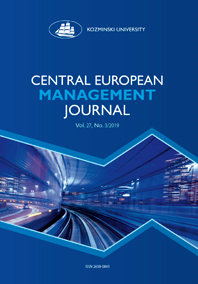Environment Characteristics and Internationalization of SMEs: Insights from a Polish and Finnish Sample
Environment Characteristics and Internationalization of SMEs: Insights from a Polish and Finnish Sample
Author(s): Adam Oleksiuk, Agnieszka PleśniakSubject(s): Business Economy / Management, Energy and Environmental Studies
Published by: Akademia Leona Koźmińskiego
Keywords: international environment; internationalization of SMEs; Polish SME-exporters; Finnish SME-exporters;
Summary/Abstract: Purpose: The article presents research on enterprises from various economic environments, namely the mature Finnish market and the Polish post-transformation one. Thus, our study examined how the external (international) environment affected the internationalization and business opportunities of Polish and Finnish SMEs.Methodology: Data for the Polish sub-sample was collected from January to February 2021 using the mixed CATI/CAWI method. We used multigroup confirmatory factor analysis (MGCFA) to check for measurement invariance, and chi-square independence test and logistic regression to verify the hypothesis.Findings: Perceiving the environment as hostile hinders internationalization for Poland only and not for Finland. According to theoretical premises and earlier studies, entrepreneurial marketing orientation (EMO) increases the probability of internationalization in both countries. However, countries differ in terms of which EMO dimensions – and to what extent – influence internationalization.Implications: In turbulent times, such as a pandemic, respondents might take the worst moment of turbulence as a reference point while assessing environmental hostility and appraising it as favorable. Perceiving the environment as hostile hinders internationalization in some sets only. In a mature economy, resources such as human capital, managerial experience, and access to finance may help to mitigate the negative influence of environmental hostility on internationalization. Respondents in both countries perceived the EMO dimensions in a similar way, so the EMO scale proved to be invariant and useful in a different country setting. Nevertheless, the EMO dimensions that are the main drivers of internationalization were country specific.Originality: The article presents a study on the influence of environment characteristics on the internationalization of enterprises from various economic environments, i.e. the mature Finnish market and the Polish post-transition one. Thus, the article fills the literature gap regarding comparative studies of small and medium-sized enterprises (SMEs) acting in different country sets.
Journal: Central European Management Journal
- Issue Year: 30/2022
- Issue No: 3
- Page Range: 175-194
- Page Count: 20
- Language: English

